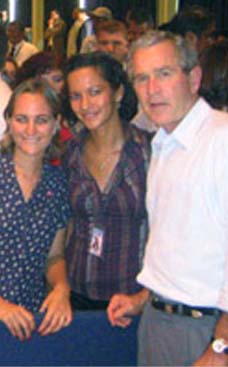October 1, 2005: Headlines: Learning: Action Learning: Organizational Development: Education: Organization Development Journal: Action learning (Evans, 1998) is a process that embeds a learning culture in groups, facilitating positive change for a wide range of organizations such as Motorola, Xerox, Peace Corps, and United Nations Development Program
Peace Corps Online:
Peace Corps News:
Peace Corps Library:
Education:
January 23, 2005: Index: PCOL Exclusive: Education:
October 1, 2005: Headlines: Learning: Action Learning: Organizational Development: Education: Organization Development Journal: Action learning (Evans, 1998) is a process that embeds a learning culture in groups, facilitating positive change for a wide range of organizations such as Motorola, Xerox, Peace Corps, and United Nations Development Program
Action learning (Evans, 1998) is a process that embeds a learning culture in groups, facilitating positive change for a wide range of organizations such as Motorola, Xerox, Peace Corps, and United Nations Development Program
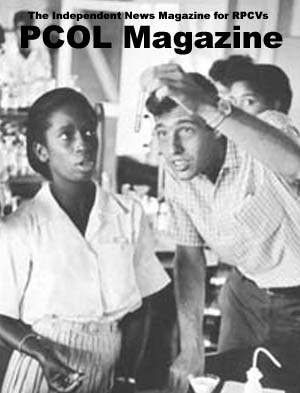
For action learning to occur, there are six distinct and necessary ingredients: a problem; a group; the questioning and reflection process; the commitment to taking action; group commitment to learning; and a facilitator (Marquardt, 1999). The facilitator's central task is to ensure that the other five ingredients are included, acknowledged, and developed by the group, resulting in a learning culture that is safe for participants to develop their thinking by exploring options outside programmed group or academic knowledge. This exploration requires group commitment to innovation. Innovation entails group commitment to openness and honesty as prerequisites for critical thought and expression, which in turn strengthen group identity and cohesion.
Action learning (Evans, 1998) is a process that embeds a learning culture in groups, facilitating positive change for a wide range of organizations such as Motorola, Xerox, Peace Corps, and United Nations Development Program
Action Learning: Developing a Learning Culture in an Interdisciplinary Rehabilitation Team
Oct 1, 2005 - Organization Development Journal
[Excerpt]
Action Learning
Action learning (Evans, 1998) is a process that embeds a learning culture in groups, facilitating positive change for a wide range of organizations such as Motorola, Xerox, Peace Corps, and United Nations Development Program (Dotlich, & Noel, 1998; Marquardt, 1999). A structured process enables group exploration, definition, actioning, and evaluation of complex and work-related problems.
Conceptually, the action learning cycle (figure 1) consists of four phases (Zuber-Skerritt, 2000). First, the identified problem must be of immediate relevance to the group, within the power of the group to solve and be problems (or opportunities) where no single course of action is evident. Next, the problem-solving process begins by a process of individual reflection, followed by group discussions to examine critically the language used and reach consensual agreement on the meaning of this language and related concepts. This process facilitates movement from unawareness, feelings of anxiety, unsafe risk, and confusion to a supportive, questioning, and learning environment that engages and extends individuals beyond programmed knowledge to pose and explore increasingly insightful questions.
The questions, rather than individuals, become the focus of attention and the "problem" to be solved, facilitating exploration of possible actions. Thirdly, the group identifies the most applicable action, based on their increased knowledge and implements the action. Finally, they evaluate its effectiveness. If the evaluated solution to a problem does not meet the group's requirements, further rounds of action learning are repeated to address the problem.
For action learning to occur, there are six distinct and necessary ingredients: a problem; a group; the questioning and reflection process; the commitment to taking action; group commitment to learning; and a facilitator (Marquardt, 1999). The facilitator's central task is to ensure that the other five ingredients are included, acknowledged, and developed by the group, resulting in a learning culture that is safe for participants to develop their thinking by exploring options outside programmed group or academic knowledge. This exploration requires group commitment to innovation. Innovation entails group commitment to openness and honesty as prerequisites for critical thought and expression, which in turn strengthen group identity and cohesion.
The attributes the facilitator encouraged the group to develop are (Marquardt, 1999):
1. Commitment to solving the problem by individual ownership of the problem and a focus on collective problem-solution as o opposed to attributing cause or blame. By implication, this also includes clarification of what the group can and cannot control and a resultant focus on those things it can control.
Figure 1. The Action-Learning Cycle
2. Increasing participants' ability to listen, to question themselves and others in a positive manner that seeks to clarify, explore, and search for greater knowledge of and insight into the problem.
3. A willingness to be open, risking vulnerability and identifying knowledge gaps and therefore trusting other participants to assist one another in learning.
4. Evidence that participants value each other's inherent knowledge, potential to advance knowing, and point of view.
5. Group commitment to taking action and belief in their ability eventually to succeed.
6. A personal awareness of both their own and others' ability to learn and develop; that is, acknowledgement that the group process facilitates personal and professional development.
The development of these six characteristics, within the context of real work problems, is the primary goal of the facilitator. Once these characteristics are embedded, the facilitator should disengage and allow the team to undertake continuing self-facilitated reflection, action and evaluation. In the reported case study, the facilitator withdrew after the six reported action learning cycles.
When this story was posted in November 2005, this was on the front page of PCOL:





Peace Corps Online The Independent News Forum serving Returned Peace Corps Volunteers
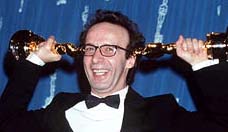 | PC establishes awards for top Volunteers
Gaddi H. Vasquez has established the Kennedy Service Awards to honor the hard work and service of two current Peace Corps Volunteers, two returned Peace Corps Volunteers, and two Peace Corps staff members. The award to currently serving volunteers will be based on a demonstration of impact, sustainability, creativity, and catalytic effect. Submit your nominations by December 9. |
 | Why blurring the lines puts PCVs in danger
When the National Call to Service legislation was amended to include Peace Corps in December of 2002, this country had not yet invaded Iraq and was not in prolonged military engagement in the Middle East, as it is now. Read the story of how one volunteer spent three years in captivity from 1976 to 1980 as the hostage of a insurrection group in Colombia in Joanne Marie Roll's op-ed on why this legislation may put soldier/PCVs in the same kind of danger. Latest: Read the ongoing dialog on the subject. |
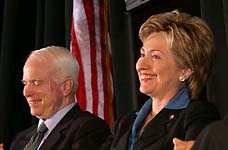 | Peace Corps at highest Census in 30 years
Congratulations to the Peace Corps for the highest number of volunteers in 30 years with 7,810 volunteers serving in 71 posts across the globe. Of course, the President's proposal to double the Peace Corps to 15,000 volunteers made in his State of the Union Address in 2002 is now a long forgotten dream. With deficits in federal spending stretching far off into the future, any substantive increase in the number of volunteers will have to wait for new approaches to funding and for a new administration. Choose your candidate and start working for him or her now. |
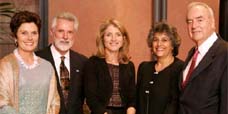 | 'Celebration of Service' a major success
The Peace Corps Fund's 'Celebration of Service' on September 29 in New York City was a major success raising approximately $100,000 for third goal activities. In the photo are Maureen Orth (Colombia); John Coyne (Ethiopia) Co-founder of the Peace Corps Fund; Caroline Kennedy; Barbara Anne Ferris (Morocco) Co-founder; Former Senator Harris Wofford, member of the Advisory Board. Read the story here. |
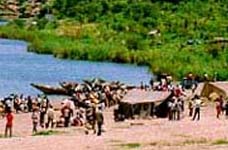 | PC apologizes for the "Kasama incident"
The District Commissioner for the Kasama District in Zambia issued a statement banning Peace Corps activities for ‘grave’ social misconduct and unruly behavior for an incident that occurred on September 24 involving 13 PCVs. Peace Corps said that some of the information put out about the incident was "inflammatory and false." On October 12, Country Director Davy Morris met with community leaders and apologized for the incident. All PCVs involved have been reprimanded, three are returning home, and a ban in the district has since been lifted. |
 | The Peace Corps Library
Peace Corps Online is proud to announce that the Peace Corps Library is now available online. With over 30,000 index entries in 500 categories, this is the largest collection of Peace Corps related stories in the world. From Acting to Zucchini, you can find hundreds of stories about what RPCVs with your same interests or from your Country of Service are doing today. If you have a web site, support the "Peace Corps Library" and link to it today. |
 | Friends of the Peace Corps 170,000 strong
170,000 is a very special number for the RPCV community - it's the number of Volunteers who have served in the Peace Corps since 1961. It's also a number that is very special to us because March is the first month since our founding in January, 2001 that our readership has exceeded 170,000. And while we know that not everyone who comes to this site is an RPCV, they are all "Friends of the Peace Corps." Thanks everybody for making PCOL your source of news for the Returned Volunteer community. |
Read the stories and leave your comments.

Some postings on Peace Corps Online are provided to the individual members of this group without permission of the copyright owner for the non-profit purposes of criticism, comment, education, scholarship, and research under the "Fair Use" provisions of U.S. Government copyright laws and they may not be distributed further without permission of the copyright owner. Peace Corps Online does not vouch for the accuracy of the content of the postings, which is the sole responsibility of the copyright holder.
Story Source: Organization Development Journal
This story has been posted in the following forums: : Headlines; Learning; Action Learning; Organizational Development; Education
PCOL23865
43







